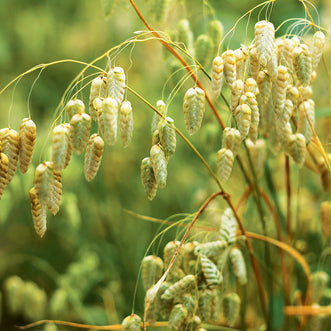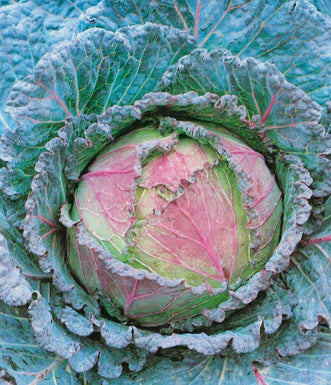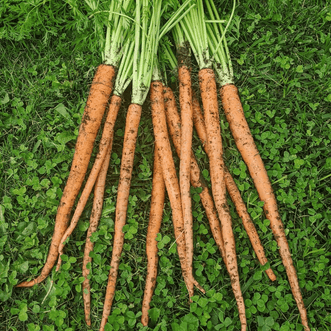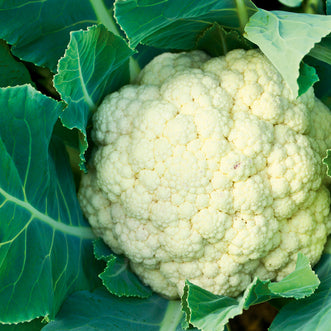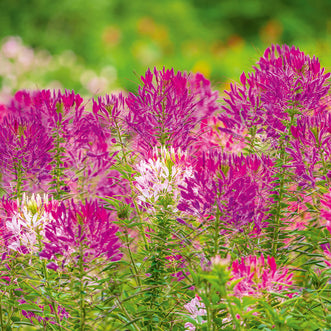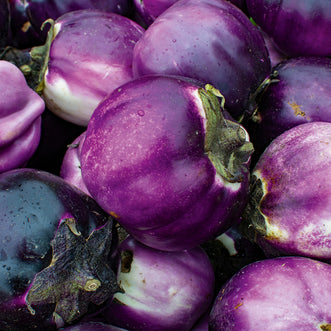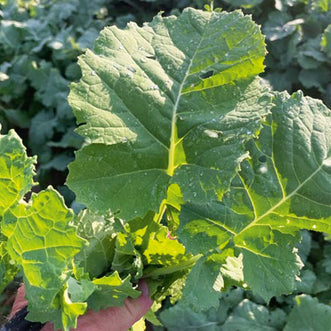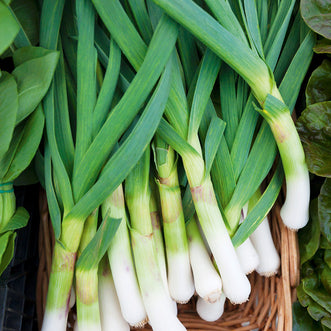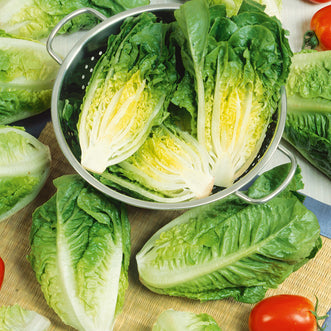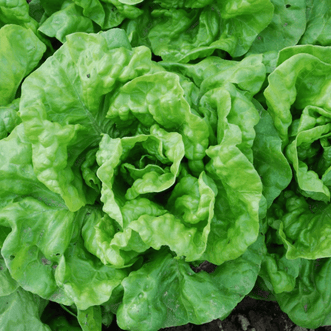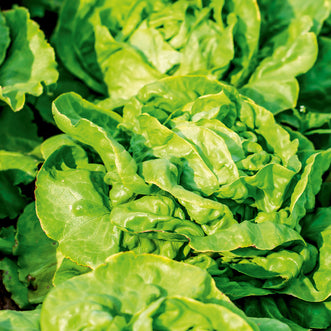Guide to Companion Planting
TylerCompanion planting is the practice of planting different crops within the same area to help with pest control, pollination, attracting beneficial insects, increasing crop productivity and maximising limited space. A commonly known example of this is the Three Sisters planting method, where maize, beans and squash are all grown together. The maize provides a trellis for the beans to climb up, the beans, in turn, help support the maize in strong winds and fix nitrogen in the soil. The squash thrives on the fixed nitrogen from the beans and the large leaves of the plant help to shade over any empty soil and prevent weeds from establishing.
There are a huge amount of companion planting combinations that may be of use. Here are some of the combinations we recommend:
Vegetables:
Alliums - Onions are a great companion to members of the brassica family, tomatoes, lettuce and peppers. Herbs such as winter savory, marjoram, rosemary, mint and parsley all help to develop the flavour of your onions. Avoid planting near peas, beans, turnips and sage.

Asparagus - Plant with tomatoes, parsley or basil to repel asparagus beetle and coriander, comfrey or dill to repel mites and aphids. Avoid planting near garlic and onions.

Beans - Corn and squash to utilise the Three Sisters planting method. Catnip, marigolds or nasturtiums to repel pests. Avoid planting near Beets, members of the allium family or sunflowers.

Beets - Beets get along well with members of the Brassica family, lettuce and onions. Things to avoid are beans and mustard.

Brassica - Brassica are a pretty friendly bunch and have quite a few companions that they suit growing near. To enhance productivity and flavour, plant near agastache, soybean, beets, borage, buckwheat, carrots, dill and marjoram. For pest management, look to incorporate one of the following next to your brassica: borage, celery, onions, calendula, chamomile, dill, marigold, rosemary, sage or thyme. Avoid planting near corn, asparagus, pumpkins, watermelons and radishes.

Carrots - With carrots being a root crop, growing these alongside other varieties that grow above the ground and have shallow roots is a great way to make the most of space. Lettuce and many herbs are perfect for this. Sage, rosemary and chives are great for pest deterrent and chives have an extra bonus of helping improve the flavour of carrots. Avoid other root crops as well as dill and celery.

Cucumbers - Like brassica, cucumbers get along well with quite a few different vegetables. They make good companions for peas, corn, beans, radish, beets, carrots and onions. Marigolds, nasturtium and oregano work well to repel insect pests while dill helps attract beneficial predatory insects. Poor companions for cucumbers are potatoes, sage and melons.

Eggplant - Eggplants need to absorb a large amount of nitrogen from the soil. Instead of buying fertilizer all the time, consider companion planting with nitrogen fixing legumes such as peas and beans. To repel pests, marigold, oregano and kohlrabi will help. Avoid planting near fennel, geraniums and heavy feeding plants that will fight for nutrients such as corn.

Lettuce - Lettuce has very shallow roots and large leaves above the ground. This makes them a perfect companion for any root crops such as carrots, beets, turnips etc... Plant chervil, chives, coriander, mint and nasturtiums to repel insects. Calendula is also beneficial to plant near lettuce but in an unusual way. Slugs are attracted to calendulas more so than lettuce and will feed on the calendula rather than your precious lettuce.

Melons - Melons are one of the most compatible plants in your garden. They thrive when planted around peas, beans, alliums, brassicas, sunflowers, lettuce and carrots. Marigold and nasturtiums will also make great companions with repelling insects as well as adding a lovely dash of colour.

Peas - Peas grow well with most other vegetables. They are excellent companions with lettuce, spinach, radish, cucumbers, carrots, brassica and beans. The only thing you should avoid planting them near are members of the allium family.

Pepper - Herbs are great mates with peppers, many of them making wonderful companions. Basil, parsley, dill and chives will help with any insect issues you're running into, whilst marjoram, rosemary and oregano may help with the flavour. Peppers also do well alongside beans, peas, corn, carrots, cucumber, radish and squash. Spinach and lettuce also help with crowding out weeds when planted nearby. Avoid planting near members of the Brassica family and fennel.

Chillies - Some good neighbours for chillies are tomatoes, eggplant, cucumbers, pumpkins and peppers. Many herbs also thrive alongside chillies such as basil, oregano and rosemary whilst also deterring pest insects. There are a few neighbours that don't get along well with chillies. Kohlrabi, peas, beans, beetroot and fennel will also reduce the success of your plants.

Pumpkins - Pumpkins can take advantage of the 'Three Sisters' planting technique, getting paired up with corn and beans. They also get along well with a bunch of different herbs. Marjoram is said to help improve the flavour of fruit whilst other herbs such as oregano, dill, chives and tansy help to repel insects, as do marigolds and nasturtiums.

Radish - Brassica and peas are radish's best friend. They both provide nutrients to your soil which will help your radishes thrive. To repel insects, chervil, marigold, dill, rosemary, marigold and nasturtiums are all great options. The only things to avoid planting near radish are hyssop and fennel.

Spinach - A great companion for Brassica, eggplants, leeks, lettuce and peas. Both the leeks and eggplants will keep pests away but the likes of chervil or coriander can also help with this. Avoid planting near potatoes, they take away too much nutrition from the soil that spinach also requires, and fennel.

Squash/Zucchini - Like pumpkins, work well in the 'Three Sisters' planting method, growing around beans and corn. They also do well around melons and radishes. If you are trying to improve the growth and flavour, borage is said to help. Avoid planting near Brassicas or potatoes.

Tomatoes - Are a favourite among gardeners and are known to be easy to grow. Tomatoes are heavy feeders requiring large amounts of nitrogen therefore, beans and peas make for great companions due to their ability to fix nitrogen in the soil. Lettuce also makes a great filler between tomato plants to ensure weeds do not crop up. Other usual vegetable neighbours are alliums, beets, radishes and carrots. Herbs and flowers that are helpful are borage, calendula, chives, lemon balm, nasturtium, sage, oregano and parsley. Bad companions for tomatoes are Brassica, eggplants and fennel.

Herbs:
Anise - Plant Anise and Coriander seeds together. They will both germinate more quickly. Keep the soil moist and separate them when the seedlings have grown a little.

Basil - Basil repels the white fly and makes a good companion to tomatoes, both in the garden and in the kitchen. You need three basil plants to every tomato plant for it to be effective. Basil also helps to repel flies and mosquitoes so a pot or basket is handy in the kitchen and outdoors near the BBQ. Basil dislikes being planted near Rue. Basil attracts bees for general garden fertility.

Borage - Planted in the strawberry patch, it will increase the crop. Borage is also a good companion to tomatoes and squash. It will attract bees to your garden.


Chamomile - Encourages other plants to increase their essential oils which makes them taste and smell more strongly. Avoid too much Chamomile next to onions and cabbages. Chamomile tea made by soaking the flowers in cold water for a day or two is a useful spray for some plant diseases, especially damping off. Rich in calcium it also keeps compost heaps sweet and healthy.

Chervil - Chervil improves the flavour of carrots if grown near them, and radishes planted near will have a hotter taste.

Chives - Carrots grow larger and healthier when planted near Chives. Chives help delay parsley from going to seed. If grown underneath apple trees, chives help to prevent apple scab. They are also said to help control aphids and black spot on roses. Cooled chive tea, made from chopped herb with boiling water, helps combat downy and powdery mildew.

Coriander - Sown with Anise seeds, it helps both seeds germinate more quickly. Coriander repels aphids. Don’t grow it near Fennel it hinders Fennel’s seed formation.

Dill - Cabbage grows well if planted near Dill. So do celery, corn, lettuce and cucumber. Dill has a reputation for being an enemy of carrots. This is only true if the Dill is allowed to flower when it will suppress the carrot crop. If it is not allowed to flower, Dill gets on very well with carrots. Don’t plant Dill near Fennel as they may cross-fertilise.

Fennel - Don’t grow Fennel in the vegetable garden. It is particularly disliked by tomatoes, beans, kohlrabi, caraway and wormwood. Fennel repels fleas, so grow it around the dog kennel.

Hyssop - Good for both cabbages and grapes. It helps deter white butterfly. A good insect repellent if planted in the vegetable or flower garden. Keep away from radishes.

Lavender - Is of general benefit to all kinds of plants in the garden but particularly repels all varieties of moths from laying their eggs. Silverbeet does well next to Lavender.

Lemon Balm - Attracts bees. Improves the growth and flavour of tomatoes.

Lovage - An all-round garden helper. It improves the health and flavour of most other plants if situated near them.

Marjoram - Marjoram has beneficial effect on most vegetables if planted near them.

Nasturtium - A useful insect repellent. Plant a few around broccoli, cauliflower, cabbage, radishes and fruit trees.

Oregano - Plant near broccoli, cabbage and cauliflower to repel cabbage butterfly and improve the flavour of these vegetables. It also seems to benefit grapes.

Parsley - Grow Parsley near Chives, but away from Mint. It aids the growth of roses, tomatoes, asparagus, beans and carrots.

Rue - Rue hates Basil. Roses, strawberries and fig trees benefit when planted near Rue. It is an effective fly repellent. Dogs and cats hate it so if neighbourhood pets are a problem, plant Rue to deter them.


Thyme - Plant next to cabbages. Bees love thyme flowers so leaving some in your garden go to flower is a great idea.








